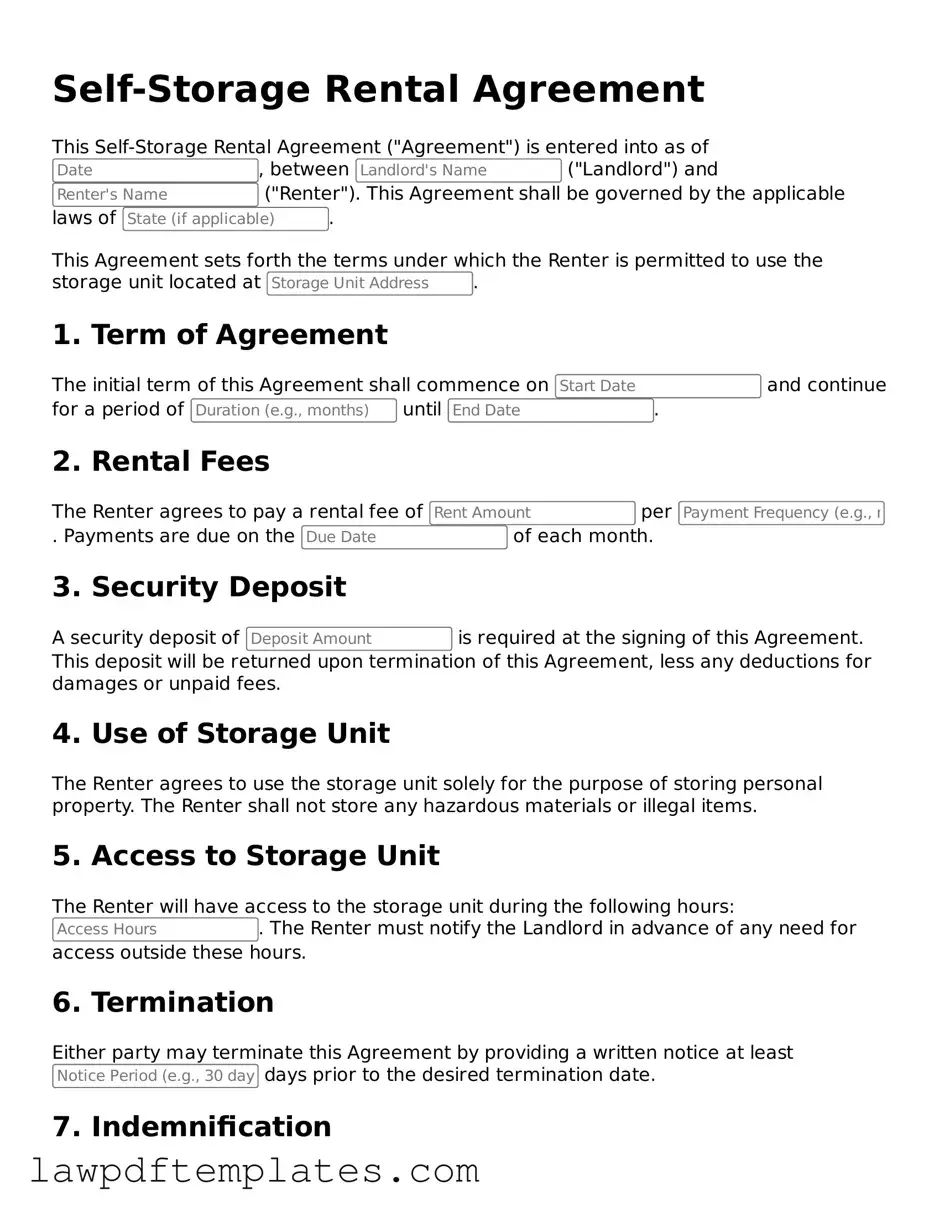Attorney-Approved Self-Storage Rental Agreement Document
Form Breakdown
| Fact Name | Description |
|---|---|
| Definition | A Self-Storage Rental Agreement is a contract between a storage facility and a customer for the rental of storage space. |
| Governing Law | The agreement is typically governed by state laws, which may vary. For example, California's Self-Service Storage Facility Act applies to such agreements. |
| Duration | The rental period can vary. It may be monthly, yearly, or based on specific terms agreed upon by both parties. |
| Payment Terms | The agreement outlines the payment amount, due dates, and acceptable payment methods. |
| Security Deposit | Many agreements require a security deposit, which may be refundable upon termination of the contract, subject to conditions. |
| Access Rights | The agreement specifies the hours during which the customer can access their rented space and any restrictions that may apply. |
| Liability Limitations | Liability clauses may limit the storage facility's responsibility for loss or damage to the stored items. |
Sample - Self-Storage Rental Agreement Form
Self-Storage Rental Agreement
This Self-Storage Rental Agreement ("Agreement") is entered into as of , between ("Landlord") and ("Renter"). This Agreement shall be governed by the applicable laws of .
This Agreement sets forth the terms under which the Renter is permitted to use the storage unit located at .
1. Term of Agreement
The initial term of this Agreement shall commence on and continue for a period of until .
2. Rental Fees
The Renter agrees to pay a rental fee of per . Payments are due on the of each month.
3. Security Deposit
A security deposit of is required at the signing of this Agreement. This deposit will be returned upon termination of this Agreement, less any deductions for damages or unpaid fees.
4. Use of Storage Unit
The Renter agrees to use the storage unit solely for the purpose of storing personal property. The Renter shall not store any hazardous materials or illegal items.
5. Access to Storage Unit
The Renter will have access to the storage unit during the following hours: . The Renter must notify the Landlord in advance of any need for access outside these hours.
6. Termination
Either party may terminate this Agreement by providing a written notice at least days prior to the desired termination date.
7. Indemnification
The Renter agrees to indemnify and hold harmless the Landlord from any claims, damages, or losses arising from the Renter’s use of the storage unit.
8. Governing Law
This Agreement will be governed by the laws of the state mentioned above. In case of any dispute, both parties agree to address the issue amicably or seek resolution in the appropriate court.
9. Signatures
In witness whereof, the parties hereto have executed this Self-Storage Rental Agreement as of the date first above written.
Landlord's Signature: ________________________
Renter's Signature: ________________________
Common mistakes
Filling out a Self-Storage Rental Agreement can seem straightforward, but many people make common mistakes that can lead to confusion or complications later. One frequent error is providing incorrect personal information. Ensure that your name, address, and contact details are accurate. A simple typo can create issues when the facility needs to reach you regarding your unit or payments.
Another mistake often made is failing to read the terms and conditions thoroughly. Many individuals skip this step, assuming they understand the basic rules. This can lead to misunderstandings about payment schedules, late fees, and access hours. Take the time to read through the entire agreement. Understanding your obligations is crucial.
Many people also overlook the importance of documenting the condition of their storage unit before moving in. This step can save you from disputes over damages when you move out. Take photos or write down any existing issues and share this information with the facility manager. This creates a record that protects you.
Finally, neglecting to ask questions is a mistake that can have significant consequences. If something is unclear, don’t hesitate to seek clarification from the facility staff. Whether it’s about insurance options or what items are prohibited, asking questions ensures you have a clear understanding of your rental agreement. This proactive approach can prevent future headaches.
Consider Popular Types of Self-Storage Rental Agreement Documents
Breaking Lease Letter - Provides closure for both tenants and landlords alike.
In order to create a solid foundation for your rental relationship, utilizing a well-drafted Lease Agreement form is critical. A Lease Agreement form not only protects the rights of both landlord and tenant but also helps to clarify rental obligations, avoiding any potential misunderstandings. For those seeking a reliable template, you can find one at Fast PDF Templates, making it easier to establish clear terms for your lease.
